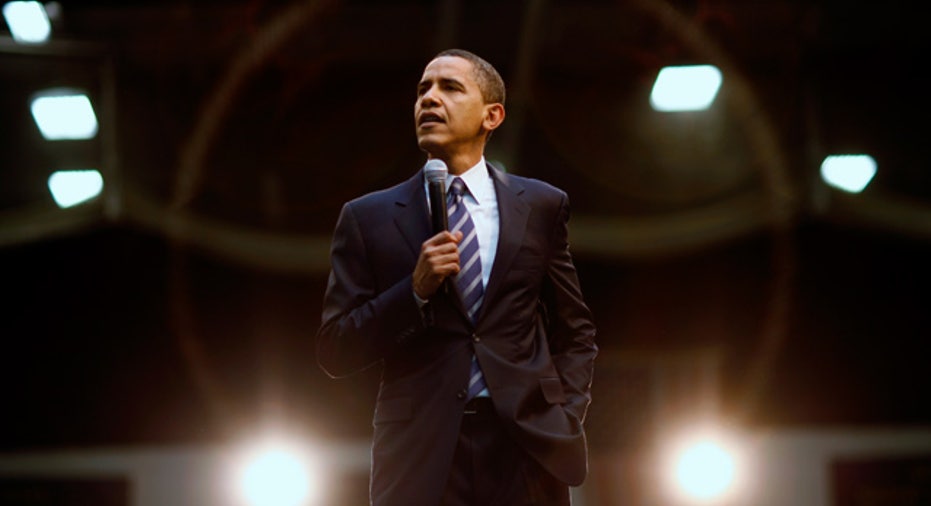Davos Attendees Divided Over Obama Speech

The rich and powerful were divided at their annual huddle on Wednesday over Barack Obama's threat to raise their taxes, with some it could hurt growth, but others arguing he was right to address capitalism's imbalances.
Obama's State of the Union address focussed on channeling middle class anger at inequality, including a call for a 30 percent minimum tax on millionaires that could make the wealth of Republican rival Mitt Romney a central election issue.
It was delivered on the eve of World Economic Forum in the Swiss ski resort of Davos, which found many of the world's titans of industry and politics in reflective mood, focusing on whether capitalism needs to be more fair to survive.
"I happen to be one of the billionaires who believe that the rich do need to pay more taxes and I do support the Obama programme in that respect," investor George Soros said in Davos.
"I'm very much a minority in the hedge fund community because they don't like to be taxed."
But other Davos regulars don't like being in the president's crosshairs.
"I don't think any presidential election in the history of America has been won on the politics of envy and I think if anything it divides the country more than unites it," said John Studzinski, senior managing director of investment and advisory firm Blackstone Group.
Unilever chief executive Paul Polman said Obama was right to address the inequality issue: "As a consumer goods company we sell to all, and it's important that all benefit from this growth, and this is what we're waiting for," he said.
But he took issue with singling out the rich: "It is not going to find a solution. This is an election speech. We need to play above that."
TAXING ISSUES
Mark Penn, chief executive of public relations firm Burson-Marsteller and White House pollster under former President Bill Clinton, said the speech should help Obama, while infighting among Republicans meant there was nobody to engage with.
"The Republican opponents are so busy attacking each other that they don't have a clear position, so Obama is making some headway, though Americans have been pretty steadfast about rejecting anything they consider class warfare," he said.
Investment income from dividends and capital gains is taxed at a much lower top rate than wages in the United States, a fact that is gaining more notice now that Romney, a wealthy former businessman and one of the favourites to be Republican nominee, has released returns showing he paid less than 14 percent of his income in federal tax last year.
"This issue is going to become an important political issue. There has been a widening of wealth and income inequality both in the United States and across advanced economies," said economist Nouriel Roubini, once known as "Dr. Doom" for bearish views predicting the 2008 financial crash.
"Having 15 percent tax on carried interest, or capital gains or dividends, is something that is creating a wedge in the country, so that's an issue that has to be addressed."
But Harvard economist Kenneth Rogoff said Obama's 30 percent target could hurt the economy. "What's being proposed of making the tax system more superficially progressive is just going to be a growth-slower," he said.
BANKS UNDER THE GUN
Obama also turned his fire on banks, promising tough regulation and threatening to find and punish those responsible for the financial crisis. Bankers in Davos were unsurprisingly wary.
"We should not throw the baby out with the washtub. When it comes to banks, there is no mechanism by which a modern economy can grow without strong banks and a strong financial sector," said Jacob Frenkel, chairman of JP Morgan Chase International.
Rogoff said rhetoric such as Obama's was likely to continue from both the left and the right.
"There is so much anger out there, the Tea Party tap into in their way, President Obama is tapping into it in his way. And I'm afraid we're in for a lot of (that)".
With the euro zone in crisis, U.S. economic growth dragging and protesters across much of the world demanding greater economic equality, there is an undercurrent of humility at this year's Davos meeting. One of the first sessions of the meeting was a debate on capitalism, sponsored by Time magazine.
Sharan Burrow, general secretary of the International Trade Union Confederation, said: "When you have the greatest inequity since just before the '30s depression, this is actually bad news for capitalism."
"If you look at taxation, this is a national sport everywhere, avoid taxation," Burrow said. "We need to say if capitalism is going to sustain itself, if it is going to provide secure jobs, it has to distribute wealth evenly and it has to make a contribution to the common good."
David Rubenstein, managing director of U.S. private equity fund Carlyle group, agreed the West had to reform capitalism.
"We've got about three to four years in the West to improve the economic model we have," he said.
"If we don't do that soon we've lost the game in competing against emerging market capitalism or state capitalism because they are having a more efficient model and are going to take jobs away from the West."



















